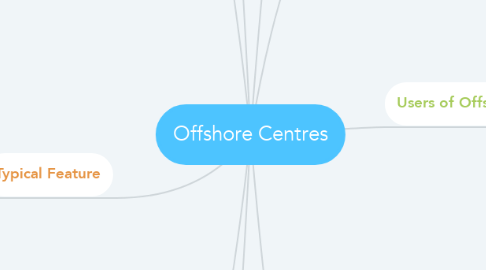
1. What is an Offshore Centre
1.1. Jurisdiction that provides lots of financial services to non-residents.
1.2. Seek to create competitive advantage through favorable tax laws or banking secrecy.
1.3. Examples of Offshore Centres
1.3.1. Crown dependencies
1.3.1.1. Jersey
1.3.1.2. Guernsey
1.3.1.3. Isle of Man
1.3.2. British overseas territories
1.3.2.1. Anguilla
1.3.2.2. Bermuda
1.3.2.3. BVI
1.3.2.4. Cayman Islands
1.3.3. Mainland countries
1.3.3.1. Monaco
1.3.3.2. Panama
2. Development of an Offshore Centre
2.1. historically developed due to lack of regulation attracting undesirable business.
2.2. this lead to increased regulation and legislation
2.2.1. Better control and supervision
2.2.2. Restored confidence and respect
2.2.3. Growth of quality business
2.2.4. Discouraged "bad" business
2.3. Now called International Finance Centres due to negative association with term offshore centres.
3. Uses of Offshore Centres
3.1. Tax efficient international trade structures
3.2. Wealth structuring
3.3. holding and investment companies
3.4. Offshore investment funds
3.5. Protection of personal wealth and estates
3.6. Captive insurance companies
3.7. ship registration
3.8. Pension funds
4. Typical Feature
4.1. Low tax regime
4.1.1. No or minimal income tax, capital gains tax, inheritance tax
4.2. Privacy and confidentiality
4.2.1. Reduced disclosure of beneficial parties
4.2.1.1. E.G. - Jersey has no public records of trusts in Jersey.
4.3. Lack of exchange controls
4.3.1. Free movement of money in & out of the country.
4.3.1.1. E.G. - Venezuela has inflated currency.
4.4. Moderate or light regulations
4.4.1. Less onerous and bureaucratic
4.4.1.1. E.G. - Jersey high reg
4.4.1.2. E.G. - Panama low reg
4.5. Areas of expertise
4.5.1. Experts attracted to good working environment.
4.6. Asset protection
4.6.1. Structures protect from law suits/divorce settlements.
4.6.1.1. E.G. - Trusts
5. OECD Tax haven requirements
5.1. No or Nominal Taxes
5.2. Lack of exchange of info with authorities
5.3. Lack of transparency
6. Onshore Offshore Jurisdiction
6.1. Is a major onshore centre
6.2. offers offshore features to non-residents
6.3. E.G - UK Non-res aren't liable to all direct taxes.
7. Users of Offshore Centres
7.1. high net worth individuals
7.2. Entrepreneurs
7.3. Small businesses
7.4. Trading companies
7.5. Multi national corporations
8. What influences choosing an Offshore Centre
8.1. Reputation
8.1.1. Legal regulations
8.1.2. Public view - Panama papers
8.1.3. Not being on the FATCA black list
8.2. human infrastructure
8.2.1. Expertise and specialists
8.2.2. Language
8.2.3. Local economy (stability & longevity)
8.3. Reporting
8.3.1. No disclosure of UBO's
8.3.2. No central registers of Trusts (closed registers)
8.4. Political and Social Stability
8.4.1. No exchange controls
8.5. Tax
8.5.1. No capital gains tax
8.5.2. No inheritance tax
8.5.3. Low income tax
8.5.4. Double tax treaties
8.5.5. Low VAT/GST
8.6. Geography
8.6.1. Transport links
8.6.2. Accommodation
8.6.3. Communications
8.6.4. Time zone
8.6.5. Climate
8.7. Legal System
8.7.1. Similarity to local laws
8.7.2. Good trust and company laws
8.7.3. Lack of interference (stable laws - not always changing)
